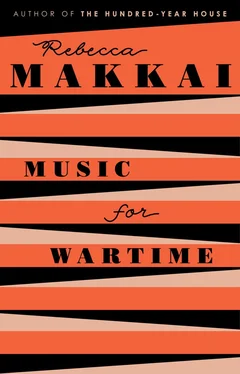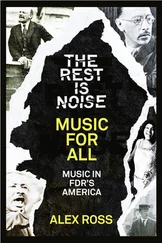
Within thirty seconds. A minute at most.

Ourselves?

Again, it had not been ordered. I imagine we each felt, in that moment, that we could be of greater service to  alive than dead.
alive than dead.

Yes, even with the — please do understand, sirs, that I cannot recall a note of the music. It was complicated, not a child’s ditty that lodges in the ear unbidden.

I could not. Not a note.

Had we been instructed to do so, we would not have hesitated to end our own lives on that very stage.

I believe so. Not to unhear music, but to forget it. Are they not the same?

The only way a lost tune, a truly lost tune, may return, is if one happens to hear it again. Surely you don’t wish to suggest that our new President could permit such an oversight as to allow a second performance of the—

I apologize most meekly.

But this was precisely my point.

We wrapped her in the black cloth that was shaped to cover the piano.

In the wings of the stage.

It seemed fitting.

No, we did not.

In that moment? I was not trying to recall the music in that moment. I was committed to my duty.

I swear to you that it does not. You could chop us open from head to foot, you could pull our hearts from our chests, and you would not find the notes.

I trust to your wisdom, kind sirs. I beg you fervently. I  . I pray.
. I pray.
T here was garbage on the lawn, or maybe a construction sign, or (now that she was close enough to notice the flowers and ribbons) discarded decorations from a prom. But it was late August, not spring. And no, it wasn’t prom garbage, but a small cross.
Celine had formed a cocoon of the summer’s clothes around her cello case in the back of the little red Saab, and driven no faster than forty-five from Vermont to Albany and the rest of the way home. She was crawling so slowly on these cracked and narrow streets that she didn’t need to brake to see the display. A white wooden cross, already weathered and tilting into more of an X than anything perpendicular. A sash across it: “Our Angel.” Red artificial flowers, crumbling brown organic ones. Stuffed animals around the base. A red velvet ribbon, the kind intended for oversize Christmas gifts, tied around the top and already frayed and faded from weeks of rain and sun.
She coasted the ten feet to her driveway, then slowly pressed the gas as the car rumbled over the gravel: under the drooping trees, past the raised beds that had once been vegetable gardens, out of sight of the memorial.
Her first reactions were horror and empathy — cut with that strange exhilaration she’d learned not to feel guilty about when passing car wrecks on the highway. Later that fall, when she became fairly sure she was a terrible person, she would at least have this to hang on to: She did feel sorry. For those first few moments, she knew she was sorry.

After she turned on all the lights, after she stomped her hiking boots to scare away any mice, and let the taps run till the water turned clear, she turned on her computer and googled her street and “car accident,” but there was nothing. She found a can of tomato soup in the cupboard, and while it heated on the stove she called the sheriff. “I’m wondering about an accident on Grove Road this summer,” she said. “There was a fatality.”
“Oh, right.” The man might or might not have been the sheriff himself. “Yeah, teenage girl on the back of her boyfriend’s motorcycle. Tried to avoid a truck, and they hit a tree pretty bad. Boyfriend’s okay, woke up from a coma back in July. You know what, it was out in front of that oriental musician’s house. That famous lady musician. She your neighbor?”
Celine hadn’t even noticed the tree, but when she went back outside she saw the old white oak had some bark missing and a decent gouge three feet up. The tree was fine, though. It had, after all, won this particular battle.
She straightened the horizontal bar of the cross and nudged one of the small teddy bears with her boot. It was rain soaked, polyester stuffing erupting from the back. Birds and chipmunks, she presumed, had been hauling off the fluff to line their homes.
It started to rain again as she carried her bags into the house, and she dug the umbrella out from under the passenger seat to hold over the cello case. She sat in the living room and played the Kodály she’d been working on for Philadelphia, his Capriccio, then rested there, silent, and enjoyed the stillness of her house and the creak of the walls — such a change from the constant noise of Marlboro, where the young, excited stars and the seasoned virtuosos had made glorious rackets for seven long, hot weeks.
By the time the smoke alarm went off, the tomato soup had already burned to a solid mess.

Twelve days later, she still hadn’t unpacked. That first day she’d considered herself too tired, too thrown by imagining the calamitous summer of emergency vehicles and witness statements she had so serendipitously avoided. And then classes started at the college, and rehearsals started in the city, and she was hardly ever home when it was light. Over the next week the clothes spread outward from the open suitcase, the hair dryer found its way back to the bathroom, and the sheet music migrated to the coffee table. She could find everything she needed, and she might never have unpacked at all were it not for Gregory and the two Mikes coming to stay.
She pushed the couch back for more rehearsal space and brought in extra chairs, and finally filed the old music away. She scraped the moldy gray cucumber out of the crisper drawer, checked the guest rooms, which only needed a sweeping and a change of pillowcases, and then at last sat cross-legged on her own bedroom floor to excavate the shirts and sandals and performance dresses of what seemed at least a year ago.
Читать дальше


 alive than dead.
alive than dead.










